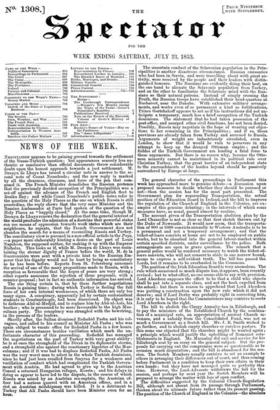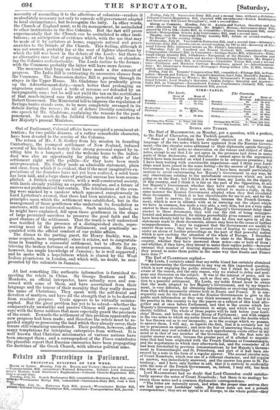The general character of the proceedings in Parliament this week
has approached more to genuine debate—a discussion upon proposed measures to decide whether they should be pursued or not—than the session has for the most part presented. The Government plan for superseding Transportation, the actual position of the Education Board in Ireland, and the bill to improve the regulation of the Church of England in the Colonies, are ex- amples of this genuine debating ; in the intervals of which some measures have, as usual, passed almost by routine. The account given of the Transportation abolition plan by the Lord Chancellor is not so clear as that first sketch thrown out by the Duke of Newcastle. It would now seem, that the transporta- tion of 800 or 1000 convicts annually to Western Australia is to be a permanent and not a temporary arrangement; and that the ticket-of-leave convicts at home are not to be employed on public works, but to be absorbed into the general labour-market within certain specified districts, under surveillance by the police. Both arrangements are open to grave question. The remark that a general police would be rendered necessary to watch the ticket-of- leave convicts, who will not consent to abide in one narrow bound, seems to express a self-evident truth. The bill has passed the Lords, but it remains to be overhauled in the Commons.
The position of the Irish Education Board is very anomalous. The rule which occasioned so much dispute has, it appears, been recently revised ; but to what effect, no one seems able to say with precision.
Lord Aberdeen supposes the effect to be that a child who objects shall be put into a separate class, and not the book expelled from the school : but there is reason to apprehend that Lord Aberdeen was putting a construction upon the new rule which it did not deserve ; and if Lord Derby was probably right in correcting him, it is only to be hoped that the Commissioners may contrive to make Lord Aberdeen in the right.
The bill to abolish the Clergy Annuity-tax in Edinburgh, and to pay the ministers of the Established Church by the combina- tion of a municipal rate, an appropriation of ancient Church re- venues, and a subsidy from the Consolidated Fund, was not so much a Government as a Scotch bill. Mr. 7. B. Smith wished to go further, and to abolish empty churches or cureless pastors. To this some one objected that the churches might be wanted again ; a principle which would justify the upholding of Romanist esta- blishments in England. Mr. Macaulay did suit and service for his Edinburgh seat by an essay on the general subject. But the pro- posals for carrying out the compromise were so questionable as to occasion much disputation; and the bill is abandoned for the ses- sion. The Scotch Members usually contrive to set an example to others in arranging their differences out of court, and thus coming before Parliament in a condition to keep their own affairs in their own hands ; but they have not managed quite so perfectly this time. However, the Lord-Advocate withdraws the bill for the session, and perhaps by next year the Scotch Members will be prepared to arrange the matter with less of open conflict.
The difficulties suggested by the Colonial Church-Regulation Bill, although not absent from its passage through Parliament, thicken about its ultimate future rather than its present passing. The position of the Church of England in the Colonies—the absolute
necessity of reconciling it to the affections of colonists—renders it as absolutely necessary not only to concede self-government adapted to local circumstances, but to recognize the laity. In other words, the Church of England must, as to its management, be assimilated to other institutions in the free Colonies. But the foot will prove experimentally that the Chnrch can be assimilated to other insti- tutions; an anticipation of evidence which, with the use that may be made of it by agitators at home, suggests natural and grave anxieties to the friends of the Church. This feeling, although it was not avowed, probably lay at the root of lighter objections by which the bill was beset in the debate of the Lords : but there is no alternative save that of passing a bill of the kind, or abandon- ing the Colonies ecclesiastically. The Lords incline to the former ; with the Commons probably the latter will have more favour.
The measures that hang on hand have made a due amount of progress. The India Bill is extricating its successive clauses from the Commons. The Succession-duties Bill is passing through its stages in the Upper House. Mr. Gladstone has prudently, given up the Advertisement-duty,—much better than prolonging an ungracious contest about a trifle of revenue not defended by an inexpugnable case; but he will not yield the tax on the certificates of that much-injured race the attornies, protected only by Lord Robert Grosvenor. The Ministerial bill to improve the regulation of Savings-banks stands over, to be more completely arranged in its details during the recess ; its all of debate literally consisting of one speech by Mr. Gladstone, explaining the reasons for the post- ponement. So much do the faithful Commons leave matters to her Majesty's present Ministers.



































